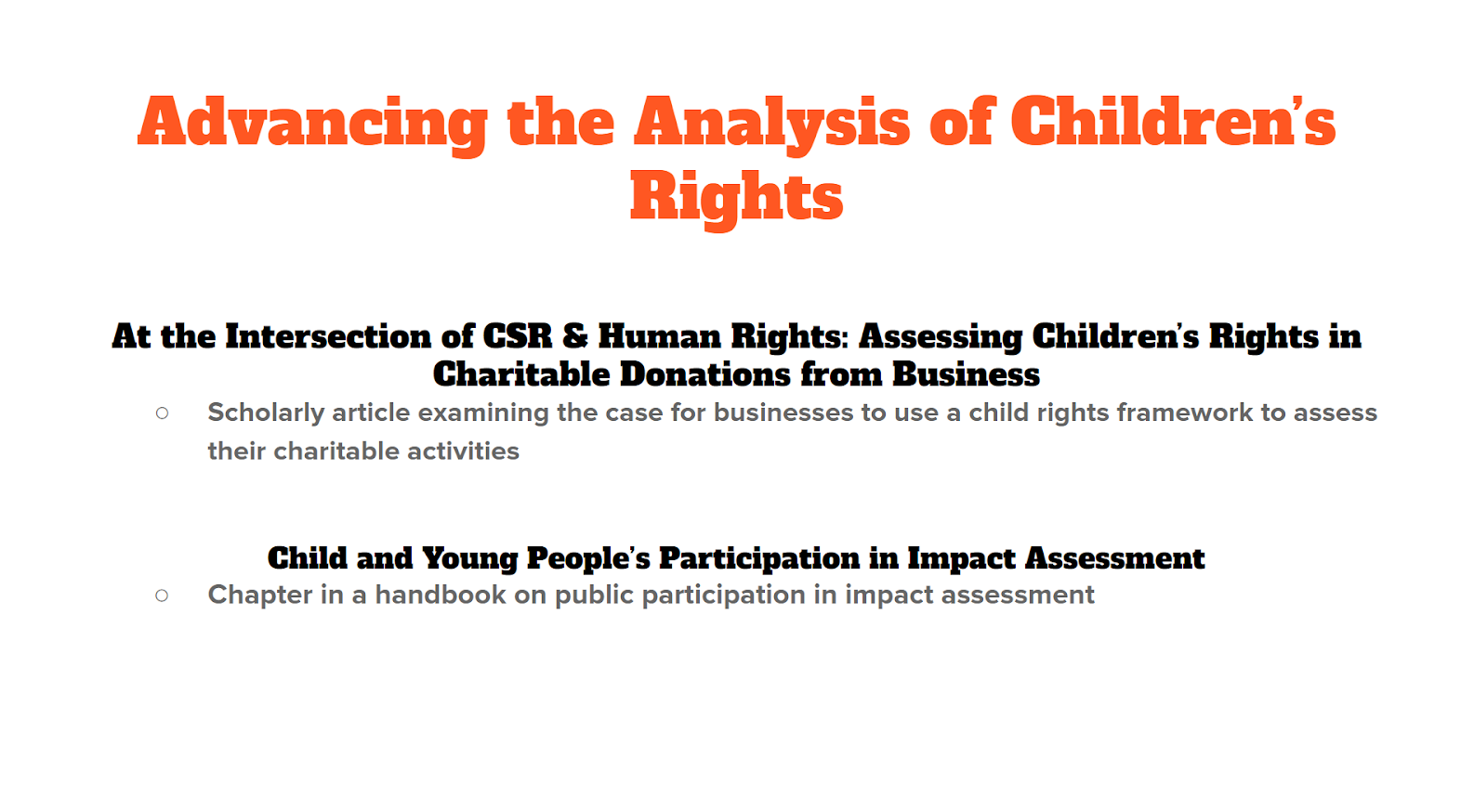Students present work from Undergraduate Research Opportunities program

The Undergraduate Research Opportunities (URO) program, funded by the Office of the Vice President, Research and Innovation, offers undergraduate students a meaningful opportunity to engage in scholarly, research and creative activities under the supervision and mentorship of professors.
Eight students from across the Faculty of Community Services (FCS) took part in the program this summer. On September 21 and 24, our students successfully shared their work with their peers and faculty at the virtual URO Showcase.
Here’s a snapshot of some of their research.

Advancing the Analysis of Children’s Rights: Assessing Children’s Rights in Charitable Donations from Business; and Child and Young People’s Participation in Impact Assessments
Student Researcher: Steven Gibson
Supervisor: Professor Tara Collins, School of Child and Youth Care
Steven Gibson and Professor Tara Collins examined children’s rights analysis in two projects: the case for businesses to use a child rights framework to assess their charitable activities; and child and young people’s participation in impact assessments across sectors. These efforts have resulted in co-author credits for Gibson on an upcoming peer-reviewed journal article, as well as a proposed chapter contribution to a handbook on public participation in impact assessment. “As businesses have an increasingly complex role in societies, they have a legal and moral obligation to respect children's rights through their activities,” Gibson explains. “The relationship between business and children should be further developed to facilitate this respect, as well as to increase opportunities for the meaningful participation of young people."

The Attitudes and Beliefs of African American Women Regarding Mental Health Services: A Womanist Explanation
Student Researcher: Kyle Williams
Supervisor: Valerie Borum, Director, School of Social Work
Kyle Williams and Professor Valerie Borum explored how the ethnocultural views of African American women impact their perceptions about mental health services and their mental health assistance-seeking behaviours, specifically regarding depression care. Key findings include:
- A preference for service provider-client race concordance
- Ethnocultural stigma towards mental health and mental health services acts as a barrier to discussing or seeking support
- The socialization process of African American women as 'strong Black women' makes it difficult to discuss mental health or seek mental health services.
The researchers recommend mental health practitioners recognize the ethnocultural beliefs and values of African American women to challenge the stigma associated with seeking mental health support. “The most impactful finding was the continued deficiency of cultural awareness in healthcare and social services,” says Williams. “This study reinforced my goal to deliver care and advocacy catering to the unique needs of each client and population I assist as a social work practitioner.”

Black Experiences with Planning in Canada
Student Researcher: Bethel Zecharias
Supervisor: Professor Magdalena Ugarte, School of Urban and Regional Planning
Bethel Zecharias and Professor Magdalena Ugarte, in partnership with The Black Planning Project, co-designed two courses that unpack Black experiences with planning in Canada. The researchers collaborated with Hogan’s Alley Society, A Different Booklist Cultural Centre, Black Futures Now, and Akoma Holdings Inc. Students now enrolled in the courses (PLG 720 Advanced Planning Studio II and PLG 532 Advanced Field Research) are engaging in community-based research to highlight Black urbanism in Halifax, Vancouver, and Toronto, both historically and in the present. As defined by urban researcher Paul Goodwin, Black urbanism refers to “the impact, engagement and contribution of Black … communities to the physical, economic, social, political and cultural environment within urban and metropolitan areas.” The courses highlight the histories of Black displacement and disenfranchisement through planning, but also experiences of Black resistance and the contemporary work of Black communities engaged in planning work in Canada.

Bridges and Barriers: A Societal Needs Analysis of Digital Methods in Disability Studies
Student Researcher: Donna Linklater
Supervisor: Professor Esther Ignagni, School of Disability Studies
This project is part of the larger Stretching our Stories: Digital World-making in Troubled Times (SOS) SSHRC partnership development grant (PDG), which will establish a new research creation program between the Re-Vision Centre for Art and Social Justice, the School of Disability Studies, and storytellers from activist communities. This summer, Donna Linklater and Esther Ignagni asked: How are the work and lives of disabled, mad and Deaf storytellers shaped by present troubled times? The researchers found that disabled people harness the digital realm through hacking to tell their stories. Study participants shared examples of disabled people adapting technology; such as using a blow tube to operate a smartphone or using powerpoint as a tool for storytelling. These actions are exemplary of “crip world making,” which disrupts normative world-making to create flexible spaces for body-mind difference. Next, the project will build on the larger PDG grant’s goals of hosting online and speculative storytelling workshops; creating and implementing inclusive multimedia story-making techniques, including critical gaming and design fiction; and centring the needs and interests of spatially and digitally sidelined communities. “The most impactful finding was seeing the complexity in people's stories,” says Linklater. “For disabled people, in particular, the pandemic created compelling layers of innovation that spoke against barriers to inclusion."

Dementia Capable Communities in Waterloo, Ontario
Student Researcher: Roslyn Vijayakumar
Supervisor: Professor Samantha Biglieri, School of Urban and Regional Planning
Professor Samantha Biglieri and her interdisciplinary team are creating a multi-scalar framework for the development of dementia inclusive communities; places that enable people living with dementia to remain engaged in usual life for as long as possible. During the first phase of the research, Roslyn Vijayakumar, Biglieri and the team identified barriers to inclusion for people living with dementia in urban, suburban and rural communities. First, Vijayakumar and Biglieri selected neighbourhoods to study. Using GIS, they created multiple maps that examined built form characteristics with other indicators such as the percentage of older adults that have a non-English mother tongue, visible minorities, and age, in Downtown Kitchener, West Waterloo and the Town of Woolwich. Preliminary findings show that while Downtown Kitchener has high levels of diversity in chosen indicators, surprisingly, it has less diversity than some suburban neighbourhoods. In West Waterloo, diversity is more prevalent in newer neighbourhoods. In the Town of Woolwich, certain communities indicate high levels of diversity, which was unexpected. During the next phase, the researchers will create a steering team to inform decisions.

Exploring the Experiences of Homelessness and Food Insecurity during the COVID-19 Pandemic among Pregnant and Postpartum Women in Toronto
Student Researcher: Rachel Ng
Supervisor: Professor Barbara Chyzzy, Daphne Cockwell School of Nursing
Homeless people who are pregnant or who have given birth during the pandemic have encountered unique and significant challenges in accessing shelter and food. Rachel Ng and Professor Barbara Chyzzy examined the perspectives of these women to learn more about which supports and services have been helpful for them. “Pregnant and postpartum people who are housing and food insecure are falling through gaps in social services during COVID-19,” says Ng. “Participants moved between 1-7 times, on average 3.4 times in 8 months whilst pregnant. Ineffective social policies, increased violence, inadequate shelters, and lack of nutritious food are barriers that have negatively influenced their experiences of homelessness.” Key recommendations from the researchers include:
- Review policies for pregnant and postpartum women in shelters
- Prioritize pregnant people for housing requests
- Increase funding for Ontario Works
- Establish more family shelters
- Provide special support for women with immigrant status, mental illness
The researchers plan to share study results with key policy makers.

Racism, Bias and Harassment towards Frontline Professionals: Experiences of Environmental Public Health Professionals (EPHPs) during the COVID-19 Pandemic Response
Student Researcher: Subrana Rahman
Supervisor: Professor Fatih Sekercioglu, School of Occupational and Public Health
Subrana Rahman and Professor Fatih Sekercioglu examined the experiences of environmental public health professionals (EPHPS), including public health inspectors and environmental health officers, during the COVID-19 pandemic. EPHPs inspect facilities, control infectious diseases and mitigate environmental health hazards. The researchers found that EPHPs face incidents of harassment, frustration from the public and a lack of support from management. These matters place EPHPs at increased risk of burnout, stress and fear. “What I have found to be most impactful is the anxiety and fear that many EPHPs face when fulfilling their tasks and interacting with the public,” Rahman explains. The researchers recommend improvements for mental health supports and reporting systems to ensure that EPHPs can meet the demands of their work.

Student Perspectives: Black Voices in the School of Early Childhood Studies
Student Researcher: Sandra Ofosu
Supervisor: Professor Kathleen Peets, School of Early Childhood Studies
Sandra Ofosu and Professor Kathleen Peets gathered the experiences of Black students in the School of Early Childhood Studies (ECS), to better understand their unique insights and lived experiences. As future stakeholders in a variety of fields related to children, it is important that ECS students are equipped to address anti-Black racism (ABR) in their future careers. While half of the students in the study expressed feelings of belonging in the school, the majority of students were dissatisfied with Black representation in the faculty and core curriculum material. About 40% of students also expressed being racially profiled by their fellow students, and almost half believed that ECS graduates will not leave equipped to address ABR in their respective fields. To enhance a sense of belonging, the researchers recommend including Black images and voices in curriculum materials and creating an environment where Black students feel ties to their culture. To increase representation, the researchers recommend hiring more Black professors, including perspectives from Black scholars in curriculum and celebrating Blackness.


